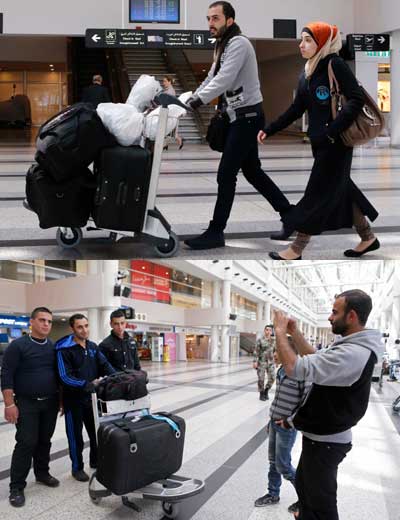
With growing uncertainity over Lebanese economy, now even loyal
patriots are scrambling to get out.
Syrian war driving new wave of Lebanese emigration
Beirut, March 29, 2014
By Oliver Holmes
In both war and peace, Lebanon has always seen many of its ambitious youth leave for better opportunities. More Lebanese live outside Lebanon than in it.
But neighbouring Syria's civil war, bombs in Lebanon and an economic slowdown have eroded confidence in the country's future and now even loyal patriots are scrambling to get out.
Olga Hawwa, a 29-year-old working in advertising, says she has given up. Graduating in 2008, she has seen her peers leave Lebanon one by one. "But I didn't want to leave because I tried to make it here," she said, sitting at a cafe in Beirut's Hamra shopping district near her office.
"I love Beirut. I love staying here; my family is here, my neighbourhood, my friends. I think it's a beautiful country and has a lot of potential."
Hawwa graduated at the right time, a lull in Lebanon's rollercoaster ride of conflict and quasi-peace.
From 2007 to 2010, the economy averaged yearly growth of 8 per cent as the country saw relative stability. She progressed in her career and became an senior account manager for an advertising firm.
Then came the war in neighbouring Syria. A million Syrian refugees have entered the country of only four million and rebels have moved into border regions to take refuge from forces loyal to Syrian President Bashar al-Assad.
Several graduates and young professionals told Reuters they were planning to leave because of the fallout from the war and that their circles of friends were shrinking by the month as their acquaintances abandoned Lebanon.
The country's own 1975-1990 civil war helped drive emigration that has left about two thirds of Lebanese living outside the country.
"Historically, Lebanon has not been able to absorb the number of graduates and professionals. More so because of the circumstances in Lebanon, even after the civil war ... people kept leaving," said Paul Tabar, the director of the Institute for Migration Studies at the Lebanese American University.
"The young fresh graduates who have family connections would love to stay. This kind of feeling dissipates when the country goes through a crisis, like the current crisis."
Syrian war
Shi'ite Hezbollah fighters from Lebanon are fighting to help Assad crush revolt and the conflict has spilt back over Syria's borders. Supporters of the Sunni Syrian rebels have bombed Hezbollah-run districts of Lebanon and fired rockets into towns supportive of Hezbollah.
Some frontier areas of Lebanon are now seeing open warfare between Hezbollah and rebel supporters.
In a campaign to end the bombings, Lebanese posted pictures of themselves holding notes condemning the violence.
"I don't want to survive, I want to live," one says. "Lebanon's main export should not be its people," says another. A third shows an airport lounge with a caption: "Our living room."
Hawwa stayed longer than many friends but has now had enough. "I feel I've reached a dead end with Lebanon. It's not safe, we can't walk around, you can't leave Beirut and enjoy life," she sighed.
"You can't go out at night and not worry that an explosion is going to happen ... or a war is going to break out."
And at work she sees a deterioration. "Our clients used to have money for advertising campaigns, for launching events. Now they have a very tight budget, if any."
"It's become very frustrating because we end up doing the very, very basic PR work; press releases or interviews. Very boring stuff. There are amazing ideas that we would love to do here, but there is no money to do it. I'm not developing."
Hawwa left her job this month. She is heading for New York to look for opportunities there and then maybe to Dubai.
She has a network; a cousin in New York, and other relatives in Boston, Switzerland, Canada, Brazil, Dubai and Saudi Arabia - Lebanese who went before her.-Reuters







